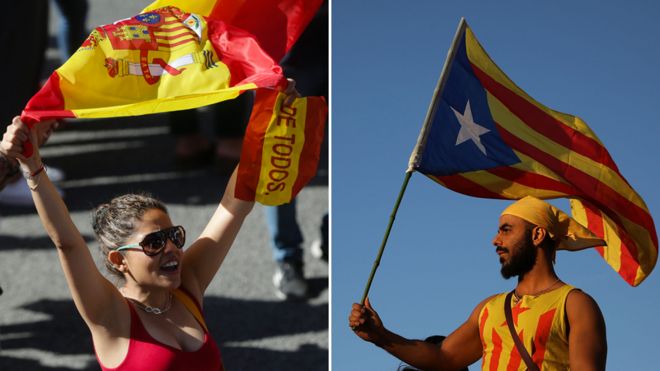
Demonstrators in Barcelona: pro-unity (left) and pro-independence
The independence
referendum in Catalonia appears to have put the region on a path to
secession from Spain. But will that happen?
Catalonia's 7.5
million people are sharply polarised. At the weekend a vast pro-unity
rally took place in Barcelona, rivalling the many pro-independence
rallies the city has seen.Here we look at the possible next moves in the bitter standoff.
Will Catalonia announce independence?
Under Catalan law - not recognised by Spain - the regional parliament can issue the formal declaration of Catalan independence within two days of the referendum results being announced.The final results from the referendum in the wealthy north-eastern region suggested 90% of the 2.3 million people who voted backed independence. Turnout was 43%.
Catalan leader Carles Puigdemont is expected to "take the referendum results to the parliament" on Tuesday and give a speech.
But a prominent ally of Mr Puigdemont, Marta Pascal, told that BBC that he would make "a symbolic statement" in the Catalan parliament - not a unilateral independence declaration.
The Spanish government will have to decide how best to oppose such moves.
Is Spain set to seize control of Catalonia?
Prime Minister Mariano Rajoy sent an extra 4,000 national police to Catalonia ahead of the 1 October referendum - a vote declared illegal by Spain's Constitutional Court. They will stay there while the crisis continues.There is huge bitterness after Spanish police lashed out at ordinary voters, hitting them with batons and dragging them away from polling stations.
The images probably damaged Spain's image internationally and boosted support for the Catalan independence movement.
They also showed Madrid's determination to stand firm against Catalan independence. So a further crackdown cannot be ruled out.
Under such circumstances, tt says the Spanish government may "issue instructions to all the authorities of the self-governing communities" such as Catalonia, the Basque Country and Galicia - meaning direct rule from Madrid.
Another option for Madrid is to call new regional elections, which could at least delay the independence drive.
More on the Catalan crisis
- Catalan Spaniards fear loss of identity
- The man who wants to break up Spain
- Catalonia vote: Spain's biggest crisis for a generation
- Reality Check: Would Catalonia be a viable country?
Is there room for compromise?
Yes. Catalan independence is by no means inevitable.Mr Puidgemont has called for negotiations - but so far Madrid has refused.
He also wants international mediation in the crisis - and there is no sign of that, as Madrid does not want it. The EU - traditionally wary of secessionist movements - sees the crisis as an internal matter for Spain.
Catalonia in numbers
-
16% of Spain's population live in Catalonia, and it produces:
-
25.6% of Spain's exports
-
19% of Spain's GDP
-
20.7% of foreign investment
Getty
What else could Madrid do?
The Spanish government could still make a gesture to appease the Catalan separatists who dominate the Catalan parliament.The independence movement was galvanised by a 2010 Spanish Constitutional Court ruling which many Catalans saw as a humiliation.
That ruling struck down some key parts of Catalonia's 2006 autonomy statute. The court refused to recognise Catalonia as a nation within Spain; the Catalan language should not take precedence over Spanish in the region; and measures giving Catalonia more financial autonomy were overruled.
The court acted after Mr Rajoy's conservative Popular Party asked it to. Now, to defuse this crisis, Madrid could agree to negotiate and could reinstate the elements of autonomy that were taken from Catalonia.
Madrid could also change Section 92 of the constitution, to allow a legally binding referendum to take place. But that would probably be harder, as it stipulates that the initiative for any referendum has to come from the Spanish government and be supported by the king.
Holding a new Catalan referendum would also be risky for Madrid, as its intransigence in the current crisis may have boosted the Catalan independence cause.
Will economic pressure make Catalonia back down?
It is a major factor now. Madrid has powerful economic levers, even though Catalonia is one of Spain's wealthiest regions.The banks Caixa and Sabadell, along with several utility companies, are moving their legal headquarters out of Catalonia, and others may follow them, as Spain has made it easier for businesses to leave.
Catalonia accounts for about one-fifth of Spain's economic output. But Catalonia also has a huge pile of debt, and owes €52bn (£47bn; $61bn) to the Spanish government.
Originally published on http://www.bbc.com/news/world-europe-41551466




0 comments:
Post a Comment